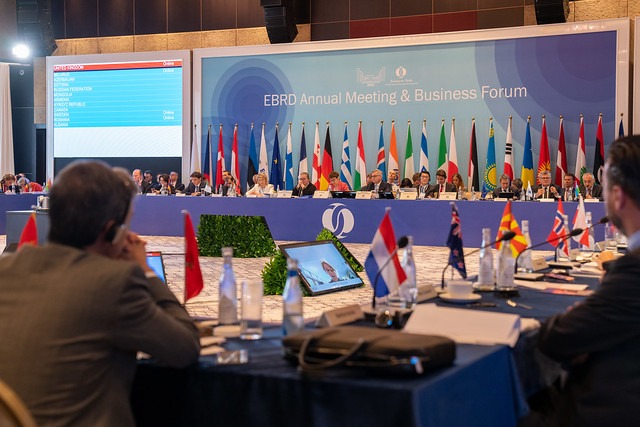

EBRD Investments in Kazahkstan
July 2024 marked a pivotal moment for Kazakhstan's national economy, as the European Bank for Reconstruction and Development (EBRD) identified the country as a primary focus for substantial investment. Will this renewed attention from European institutions and the OECD propel Kazakhstan into a new era of economic growth and international investment?
KAZAKHSTAN
Aisulu Sarmanova
7/25/20243 min read
July 2024 heralded new prospects for the future of Kazakhstan's national economy. During a meeting on July 5 with Hüseyin Özhan, the Managing Director for Central Asia, Kazakhstan was identified as the next primary focus of the European Bank for Reconstruction and Development (EBRD). The substantial quantity of anticipated investments is encouraging entrepreneurs both within Kazakhstan and abroad to reconsider their business strategies and align them with the potential for increased cooperation between Europe and Central Asia. The EBRD’s commitment is expected to bolster infrastructure projects and enhance the business environment, ultimately leading to significant economic growth. This renewed focus is likely to attract international investors eager to tap into the burgeoning opportunities in Kazakhstan’s diverse sectors, from energy to technology.
In recent years, the EBRD has actively supported Kazakhstan's overall economic state with 324 projects amounting to a total of US$11 billion in investments. The EBRD's future and existing projects encompass a range of modernisation-related topics, such as the development of renewable energy sources and addressing natural resource scarcity. For instance, one of the most notable EBRD-financed initiatives is the expansion of Metro, a chain of large department stores in Kazakhstan. Metro AG, the fourth-largest retailer in the world and a significant retail operator in the EBRD's countries of operation, has allocated a total budget of up to €80 million for this endeavour. The planned enterprise aims to introduce new, modern retail formats and the convenience of cash-and-carry shopping to residents across Kazakhstan, including those in remote regions. By sourcing products locally, the project will foster strong backward linkages and motivate local producers to adopt best business practices. Furthermore, Metro plans to launch a support programme for small retail shops, offering free advisory services and training on store layout, product assortment, and marketing strategies. This initiative, successfully implemented in other Eastern European and CIS countries, is expected to benefit both Metro and the programme participants. As a result, startups in the gastronomy sector are anticipated to receive substantial reinforcement in Kazakhstan, making this year an opportune time to initiate a business in this area. However, existing large organisations for the transport and delivery of goods, such as Eurasian Bridge Kazakhstan, remain a priority and have a high probability of fully recouping the money invested in them.
The EBRD’s activity is not limited to a single project. Currently, one of the most critical global objectives is to preserve the ecological state of the Earth sustainably. The EBRD identifies itself as a strong proponent of this idea and implements it through several projects in Kazakhstan, thereby making the green economy an attractive field for investment. The EBRD is considering providing up to US$150 million, converted into Kazakh tenge, to partner financial institutions (PFIs). These funds would be used to offer loans to private sector sub-borrowers in Kazakhstan, supporting projects focused on energy efficiency, renewable energy, resource efficiency, the circular economy, and climate resilience as part of the Bank's Green Economic Transition (GET) strategy. This framework builds on the success of the Kazakhstan Pilot Green Economy Finance Framework (GEFF) and aims to enhance investments in the green economy. Additionally, funds may be lent to vendors and producers of qualifying materials and equipment listed in the Green Technology Selector for Kazakhstan. These loans will be backed by Technical Cooperation (TC), as outlined in the GEFF Framework.
The European Bank for Reconstruction and Development is not the only international force keen on integrating successfully into the economy of Central Asia. The OECD, the Organisation for Economic Co-operation and Development, has proposed opening a representative office in Kazakhstan. William Tompson, the Head of the Eurasia Division at the OECD, highlighted the fruitful collaboration between the OECD and Kazakhstan. He noted that Kazakhstan has implemented several political and economic reforms based on the OECD's recommendations. These include establishing an investment ombudsman, enhancing parliamentary oversight of budget expenditures, launching a low-carbon development strategy aimed at 2060, and creating the Supreme Audit Chamber. Consequently, a significant influx of foreign capital is expected to flow into Kazakhstan at an accelerated rate over the next ten years.
The increased confidence in Kazakh entrepreneurship presents numerous opportunities on an international level. A promising market with a burgeoning middle class and untapped potential across various sectors highlights the country's rapid economic development. The second half of 2024 emphasises the retail sector and environmental sustainability as the most profitable investment options, making this an optimal time to pursue investments in Kazakh business.
These developments underscore an increased confidence in investing in the Kazakh economy, particularly among European institutions. This signals that the business community in Europe is beginning to perceive Kazakhstan as having the appropriate institutional and economic environment for both business investment and conducting business. The EBRD's significant financial commitments and the OECD's collaborative initiatives reflect a broader recognition of Kazakhstan's potential, fostering a conducive atmosphere for sustained economic growth and international investment.


